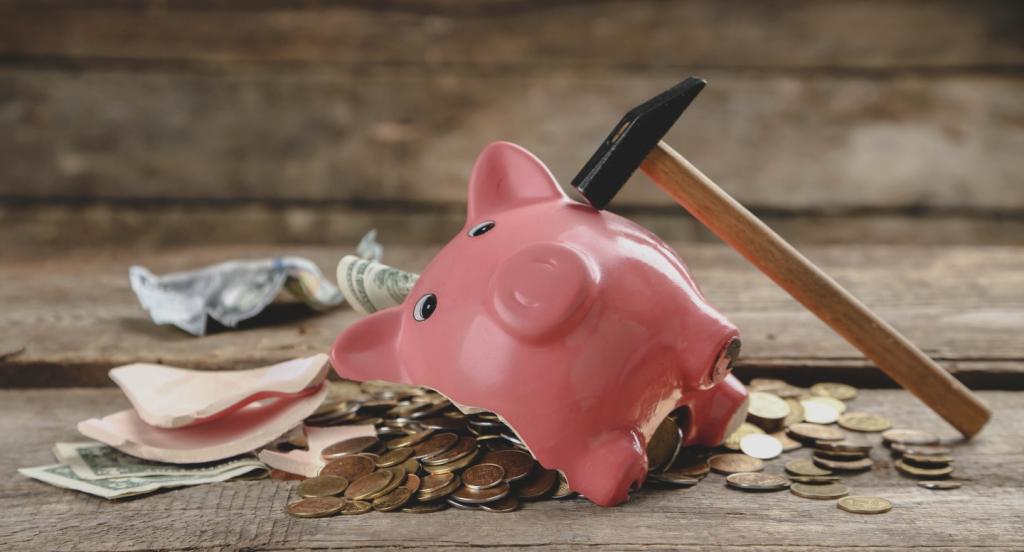Man is a master of self-deception. He is especially good at it when it comes to money. One of our main functions is the ability to saturate actions with meaning, even the most stupid and reckless ones. Therefore, when a person spends a lot, he must first of all fight with himself, and only then with the circumstances seducing him. Let's consider what does not allow us to save. The opinion of financial expert Daniel Crosby will help us in parsing.
“I work hard - I deserve it”

This is usually said by people who pamper themselves with various expensive purchases. There is only one trouble: things cannot give happiness. They are not intended for this. Things are objects that in themselves mean nothing. Other phenomena give happiness to a person: the opportunity to spend time with relatives, gain experience, learn something or “buy” a little freedom from work or work that he hates.
And consumer happiness is instant, possession gives joy only in the first few minutes. Of course, you can buy, say, a car, and it will delight you until you get used to the level of comfort and its unimaginably soft chairs, but then it will become just another thing among other items. Magic will be lost, gone.
Therefore, if suddenly a person thinks as it is said in the subtitle, let him turn his eyes to the good old eternal values that can be bought for money only partially.
Good deed
Interesting ... Yes, it would seem that kindness cannot be a problem, but there it was. Some people neglect their own well-being to help others. Such movements of the soul arouse admiration of others, but at the same time, concern of financial expert Daniel Crosby. The latter claims that, of course, you can help cats, dogs and even people, but only after a person is sure: he is financially firmly on his feet.
That is, the story of how a pensioner, living in a village house, donated a million to an orphanage, will not impress the Western expert at all. It is understandable, because the goals are different. The expert's job is to help make money, not spend, so there is no contradiction here.
By the way, in this context it would be interesting to consider the following: do pensioners who donated a million children generally need money? If he lives quietly, modestly, then maybe his financial health is in order, he simply does not need such an amount of money, and he is quite able to give a substantial surplus to children. This is an interesting topic for thought.
Moral debts

When one person takes money, it is clear why debt depresses. But human interaction is too insidious and complex thing, so that everything is limited to only one type of debt.
It also happens that someone buys lunch for you when you are out of cash. Or someone gives a too expensive present for his birthday. And you feel that you have to repay a person for his kindness, even if you, in fact, cannot afford certain expenses.
Such a model of behavior, when other people, without knowing it, make you feel guilty and need to repay a debt, leads to unplanned expenses, according to Daniel Crosby.
Someone might think that the expert approach is too rational or even cynical. But do not be too zealous and pay moral duty. Maybe your friend who presented something for his birthday is simply rich, so for him the thing presented as a gift does not present complexity and problems.You need to get into huge non-moral debts to match his gift. Do not be so nervous and strain.
Good and bad days

This is remarkably well known to everyone. When we have bad days, we try to console ourselves with the purchase of some thing, if we have good days, we try to bring the level of happiness to the maximum and also buy something.
Financial expert Daniel Crosby believes that, as a result, nothing pleasant will come of such a model for a person’s pocket. D. Crosby recalls Coco Chanel, who claimed that the best thing in the world is freedom. And those things that follow her are usually very expensive. The problem of most people in modern society is that they change freedom into things. Which, of course, should not be done.
D. Crosby urges to turn away from expensive stimulants of good mood and turn to free ones. That is, if you wanted to please yourself or, on the contrary, to dispel anguish, then visit relatives, walk along the street, go to the library, read a book that you already have at home, but do not think that multiplying things in some way will help the bad mood. And to stimulate a good mood is generally redundant.
If you earn more, you can save more
From a rational point of view, there is no contradiction. There is only one problem - this is a trick of consciousness. In fact, if a person is accustomed to postpone, then he postpones for any income (within reasonable limits), and if he does not have such a habit, then even millions of income do not promise profits.
